Call center AI agents are changing and improving the way businesses deliver customer service. These intelligent systems, powered by advancements in artificial intelligence and machine learning, handle tasks ranging from answering FAQs to managing complex customer interactions with remarkable efficiency. In this ultimate guide, we’ll delve into everything you need to know about call center AI agents, including their benefits, how they work, and the call center AI agent platforms.
What are Call Center AI Agents?
Call center AI agents are sophisticated AI-powered virtual assistants designed to enhance the efficiency of contact centers by automating customer interactions. Leveraging artificial intelligence and machine learning, these virtual agents handle tasks like responding to customer inquiries, providing self-service options, and assisting human agents with complex issues. Unlike traditional call center systems, AI agents are capable of real-time analysis of customer data, enabling them to streamline workflows, optimize customer experience, and improve operational efficiency. They’re also available 24/7 and never need a break, unlike a human assistant.
How Does a Call Center AI Agent Work?
A call center AI agent utilizes natural language processing (NLP) to understand and respond to customer conversations. These agents are integrated into contact center systems using AI Voice APIs and conversational AI technology. They can interact with customers via voice, chat, and messaging platforms, offering a seamless omnichannel experience.
Key components of how these agents work include:
- Speech recognition & NLP: Call center AI agents read and interpret customer calls in real-time using speech analytics.
- Machine learning algorithms: Call center AI agents leverage predictive analytics and sentiment analysis to adjust responses based on customer behavior and customer sentiment.
- Interactive voice response (IVR): These AI agents enhance IVR systems by providing more dynamic and personalized interactions that sound like a human receptionist compared to traditional, rigid automated menus.
- Call routing & transcription: AI agents efficiently handle call routing to human agents for complex cases and provide transcription of conversations for quality assurance and actionable insights.
AI Voice APIs: The Technology Behind Call Center AI Agents
The core technology driving call center AI agents is AI Voice APIs, which serve as the foundation for creating natural-sounding, interactive voice responses that redefine how businesses handle customer interactions. These advanced APIs utilize generative AI to replicate the nuances of human speech, including tone, pitch, and rhythm, enabling virtual agents to communicate in a way that feels personal and engaging. By leveraging this technology, call center AI agents can hold fluid, intuitive conversations with callers, providing accurate information and seamless support.
For example, Speechify offers a powerful text to speech API and AI voice API that integrate effortlessly with AI agent platforms to deliver lifelike voice interactions. These APIs are designed to power high-quality conversational experiences, ensuring that customers feel understood and valued.
Benefits of Call Center AI Agents
In today’s fast-paced, customer-centric world, businesses are turning to innovative technologies to improve service delivery and streamline operations. Contact center AI agents have emerged as a game-changing solution, offering numerous benefits to companies and their customers alike. Here’s a brief look at just some of the benefits of AI call center agents:
- Reduced wait times: By automating time-consuming and repetitive tasks and providing self-service options, AI agents help decrease wait times for customers.
- 24/7 availability: AI-powered agents can operate continuously, providing support even outside regular business hours.
- Improved customer satisfaction: Real-time analysis of customer interaction allows AI systems to adjust responses dynamically based on data-driven metrics, leading to better call center solutions and customer experiences.
- Cost efficiency: Automating routine inquiries reduces the need for live agents, lowering operational costs while improving agent productivity.
- Actionable insights: AI tools provide quality assurance and speech analytics, allowing managers to monitor agent performance and discover new ways to optimize workflows.
- Sentiment analysis: By monitoring customer tone and language during calls, AI tools can gauge customer sentiment, helping contact centers take proactive measures to address issues before they escalate.
- Language translation: AI-powered virtual agents can translate and respond to customer inquiries in multiple languages, expanding support capabilities for international customers.
- Transcription services: AI agents can transcribe calls in real-time, aiding in compliance, training, and knowledge base management.
- Workforce management support: AI systems can assist in scheduling agents, predicting call volumes, and optimizing resource allocation to enhance agent efficiency.
What Tasks Can Call Center AI Agents Handle?
AI agents are designed to optimize customer service while reducing operational costs. Let’s take a look at the diverse tasks call center AI agents can perform:
- Customer inquiries & support: AI agents can handle routine customer questions such as billing inquiries, product specifications, troubleshooting guides, and policy details. This frees up human agents to focus on more complex issues, improving overall agent productivity.
- Call routing & prioritization: AI-powered systems can analyze customer data and use predictive analytics to route calls to the most suitable agents based on the caller’s needs, reducing call handle times and optimizing contact center operations.
- Appointment scheduling & reminders: AI agents can efficiently schedule appointments, send reminders, and update schedules in real time. This is particularly useful in industries like healthcare, financial services, and hospitality where time-sensitive bookings are critical.
- Order tracking & status updates: By integrating with CRM systems, AI agents can provide customers with up-to-date information about their orders, shipping statuses, and delivery ETAs, improving customer engagement.
- Customer feedback collection & surveys: After a call, AI systems can automatically conduct surveys and gather feedback, leveraging sentiment analysis to assess customer satisfaction and identify areas for improvement.
- Outbound marketing & notifications: AI agents can conduct automated outbound calls to inform customers about promotions, new services, or important updates, ensuring personalized experiences without increasing human agent workloads.
- Billing & payment assistance: AI agents can help customers with invoice inquiries, payment confirmations, and account balance checks, as well as guide them through the process of setting up or updating payment methods.
- Technical support & troubleshooting: AI systems can walk customers through basic troubleshooting steps for technical issues, such as resetting passwords, updating software, or diagnosing connectivity problems.
- Lead qualification & follow-up: In sales environments, AI agents can qualify leads, schedule follow-up calls, and update sales teams with potential customer information, thereby increasing sales efficiency.
- Interactive voice response (IVR) Enhancement: AI improves traditional IVR systems by offering more intuitive and conversational options, enabling customers to resolve issues without needing to navigate complicated menus.
- Product recommendations & upselling: By analyzing customer behavior and historical data, AI agents can recommend products or services that align with customer needs, boosting sales and customer loyalty.
- Complaint resolution & escalation: AI systems can handle initial complaint processing, assess the sentiment of the customer, and escalate complex or sensitive issues to human agents when necessary, ensuring a smooth customer journey.
Use Cases of AI Agents
AI agents aren’t just great for call centers—they’re revolutionizing industries across the board. From simplifying administrative tasks to providing instant customer support, these virtual assistants can enhance efficiency, improve customer experiences, and reduce operational costs. Let’s explore the diverse and impactful ways AI agents can be used in various industries today.
- Healthcare industry: Virtual assistants can help patients schedule appointments, refill prescriptions, and answer common medical questions, improving service efficiency. They can enhance patient experience while reducing the workload on healthcare staff.
- Financial services: AI agents can provide instant responses to inquiries about account balances, transaction history, and payment statuses. They can ensure quick service while maintaining data security.
- Travel & hospitality: AI systems can streamline booking and cancellations, making trip planning and management smoother. They can improve the overall customer journey by automating repetitive processes.
- Retail: AI agents can assist customers with product recommendations, stock checks, and placing orders. They can enhance customer engagement and ensure a seamless shopping experience.
- Real estate & property management: AI-powered agents can handle property inquiries, rent payments, and maintenance requests. They can automate tasks like scheduling tours to improve efficiency and service quality.
- Government & public services: AI agents can assist citizens with tax filings, social benefits applications, and document renewals. They can reduce call center workload while simplifying processes for users.
- Education & online learning: AI assistants can automate tasks like student enrollment, class scheduling, and technical support. They can provide efficient help to students and faculty while enhancing the learning experience.
- Automotive industry: AI agents can help car dealerships schedule appointments, book test drives, and answer vehicle-related inquiries. They can also provide roadside assistance and support with vehicle diagnostics.
- Insurance claims processing: AI systems can guide customers through submitting claims, checking claim statuses, and providing documentation help. They can simplify the process and reduce response times.
- Banking & credit unions: AI agents can streamline loan applications, provide account details, and assist with credit card applications. They can automate these tasks to reduce processing times and enhance customer satisfaction.
- Food delivery & restaurants: Virtual agents can manage orders, confirm delivery details, and provide updates on preparation times. They can also handle customer feedback and refunds, ensuring smooth service.
- Legal services & law firms: AI systems can assist with client onboarding, appointment scheduling, and document retrieval. They can automate these tasks to free up staff for more complex legal work.
- Human resources & recruitment: AI agents can screen candidates, answer questions about job postings, and schedule interviews. They can reduce hiring time and costs while improving the candidate experience.
- Entertainment & media: AI agents can assist with ticket bookings, event inquiries, and streaming service support. They can ensure quick, efficient service for customers in the entertainment sector.
- Logistics & supply chain: AI agents can track shipments, manage inventory inquiries, and schedule deliveries. They can optimize operations and improve customer satisfaction.
Best AI Voice API for Building Custom AI Call Center Agents - Speechify AI Voice API
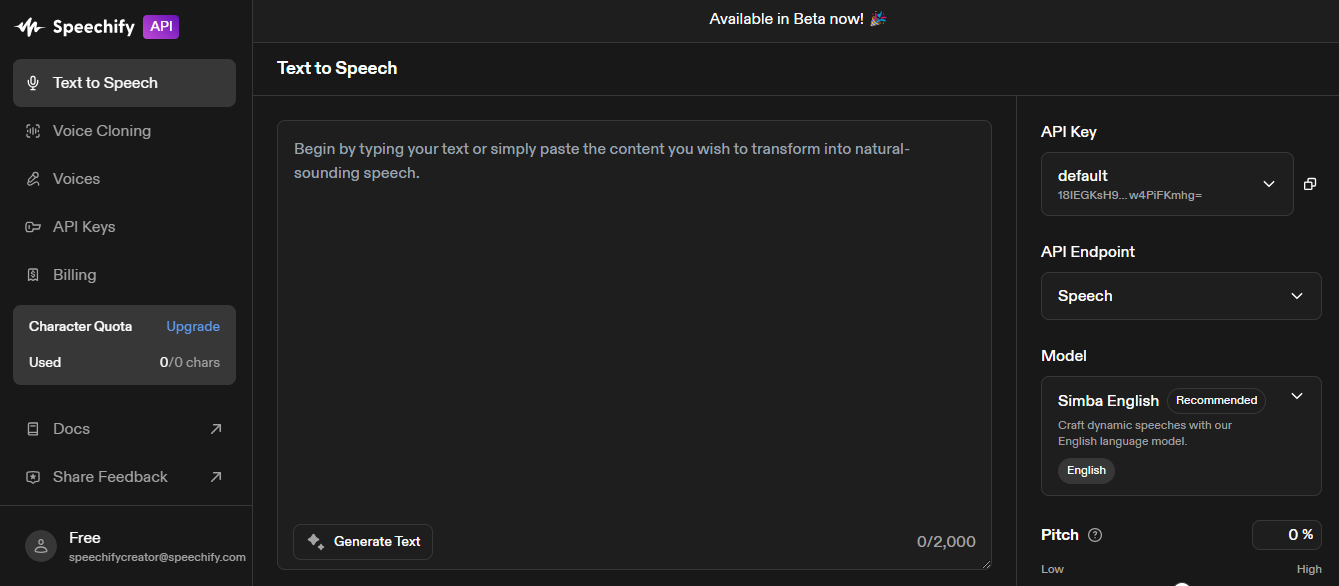
When designing custom AI solutions, such as AI call center agents, selecting the right text to speech (TTS) and voice API is essential for delivering high-quality, natural-sounding voice outputs. Speechify’s AI Voice API is the best for developers seeking to integrate advanced voice capabilities into their applications. Here’s why:
- Natural-sounding voices: Speechify’s TTS API features a library of over 200 AI voices that are clear, expressive, and lifelike. These human-like voices replicate natural speech patterns, making them suitable for various use cases, including e-learning modules, customer support interactions, and accessibility tools.
- Customization options: Developers can fine-tune Speechify’s voices to align with specific branding requirements. Features like adjustable tone, pitch, and pacing allow for highly personalized voice experiences that resonate with the intended audience.
- Multilingual and multidialect support: Supporting over 150 languages and regional accents, Speechify’s AI Voice API caters to global audiences. It includes options like Castilian and Mexican Spanish, as well as regional variations in English, French, Spanish and other languages. This versatility makes it ideal for businesses looking to engage with diverse customer bases worldwide.
- Seamless integration: Speechify’s API is designed for smooth integration across various platforms, including mobile apps, web applications, and IoT devices. Its straightforward documentation and developer support ensure quick and hassle-free onboarding.
- High scalability: The robust infrastructure of Speechify’s TTS API supports high-volume usage, making it perfect for applications requiring large-scale voice interactions while maintaining consistent performance.
- Advanced AI features: Beyond standard TTS, Speechify’s AI Voice API includes advanced features such as emotion-infused speech and contextual understanding, elevating the quality of user experiences and enhancing engagement.
- Low latency for real-time applications: Speechify’s AI Voice API delivers low latency, enabling real-time voice generation. This is crucial for applications like virtual assistants, voice-activated devices, and conversational AI tools where quick responses are necessary.
- Custom voice creation: Speechify allows businesses to create custom voices or replicate specific voice profiles using voice cloning technology. This feature helps establish a unique voice identity tailored to a brand’s needs.
Top AI Call Center Software
Developing advanced AI call center agent platforms is more accessible than ever, thanks to TTS APIs like Speechify. These tools provide natural-sounding voices, robust customization options, and multilingual support to cater to a wide range of user needs. As a result, numerous innovative call center AI solutions are emerging. Let’s explore what some of the top AI platforms in this space have to offer:
PolyAI
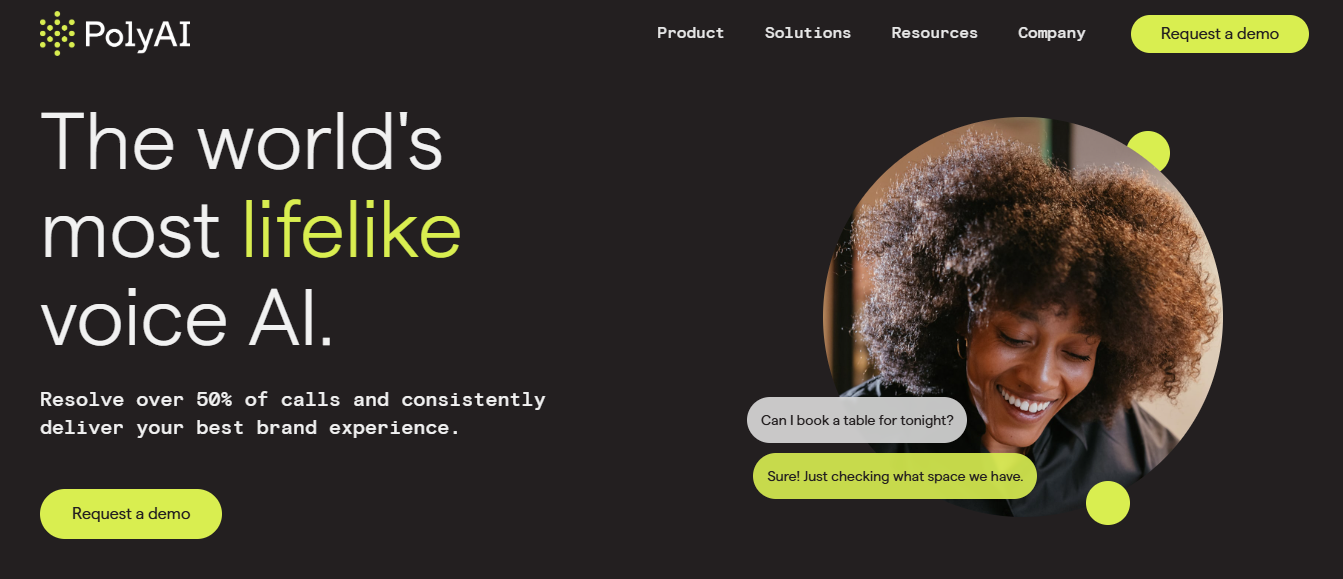
PolyAI specializes in conversational AI voice assistants designed to handle customer inquiries naturally and effectively. These agents manage tasks like answering FAQs, processing payments, and making bookings using advanced natural language understanding, ensuring consistent 24/7 support while enhancing customer satisfaction.
Hyro AI

Hyro AI focuses on adaptive communications, offering virtual assistants capable of automating scheduling and customer support tasks. Its natural language processing capabilities and seamless integration allow businesses to resolve routine inquiries efficiently, redirecting complex issues to human agents for personalized solutions.
Synthflow
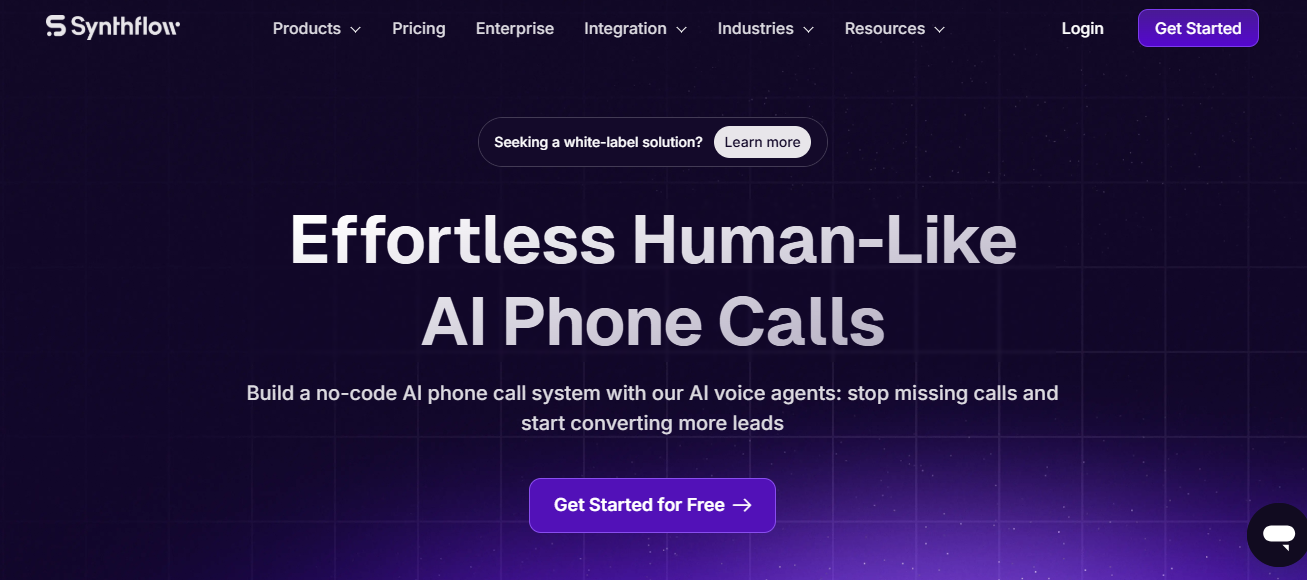
Synthflow provides a no-code platform to create customizable AI voice agents for tasks like lead qualification and appointment setting. The platform’s real-time booking, CRM integration, and analytics tools make it ideal for streamlining operations while keeping setup and scaling costs low.
Brilo AI
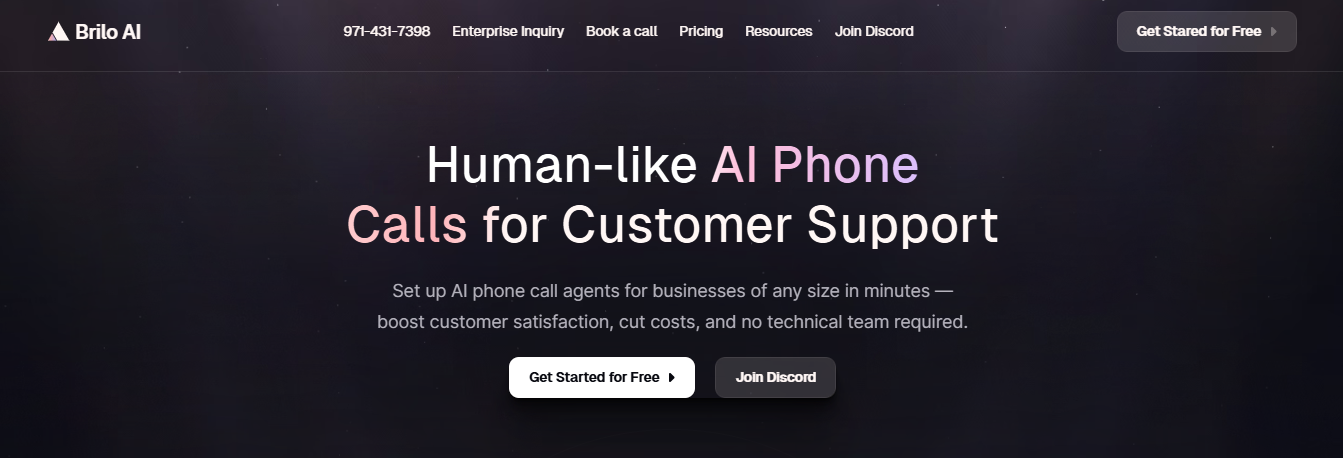
Brilo AI delivers intelligent voice assistants with real-time transcription and sentiment analysis to enhance customer support and sales calls. Its features include live call transfer and interruption handling, enabling businesses to manage high call volumes effectively across multiple industries.
Calldesk
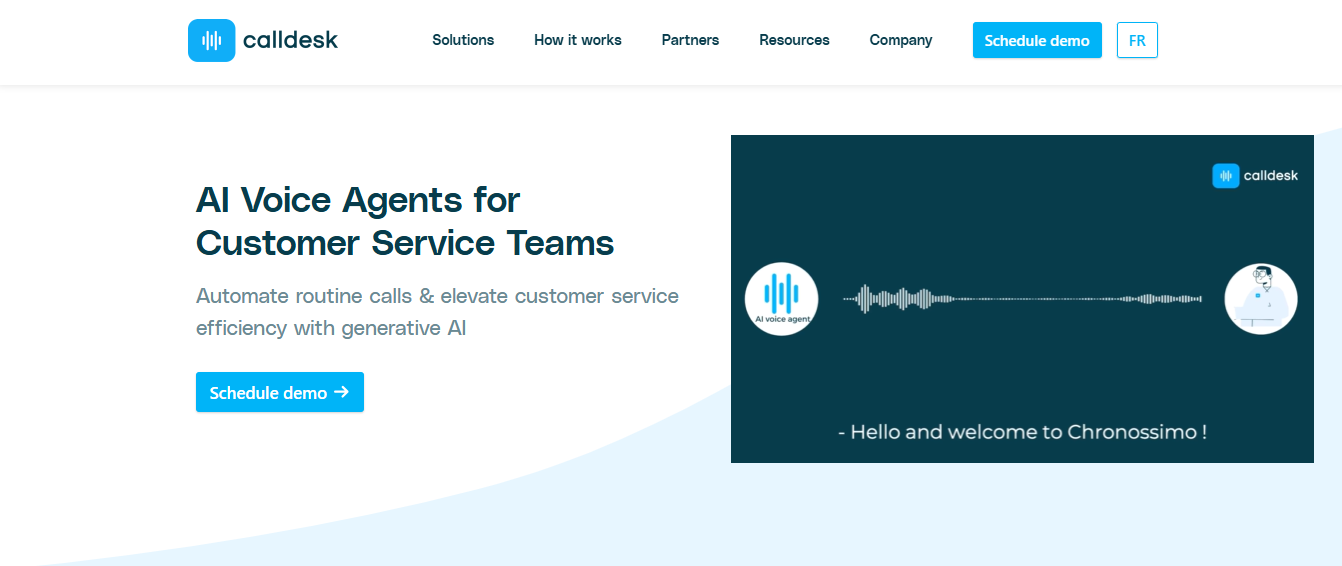
Calldesk automates repetitive call center tasks, such as appointment scheduling and information requests, with AI-powered voice agents. These agents integrate seamlessly with existing systems, offering a scalable solution for businesses seeking consistent and efficient customer service.
SmartAction
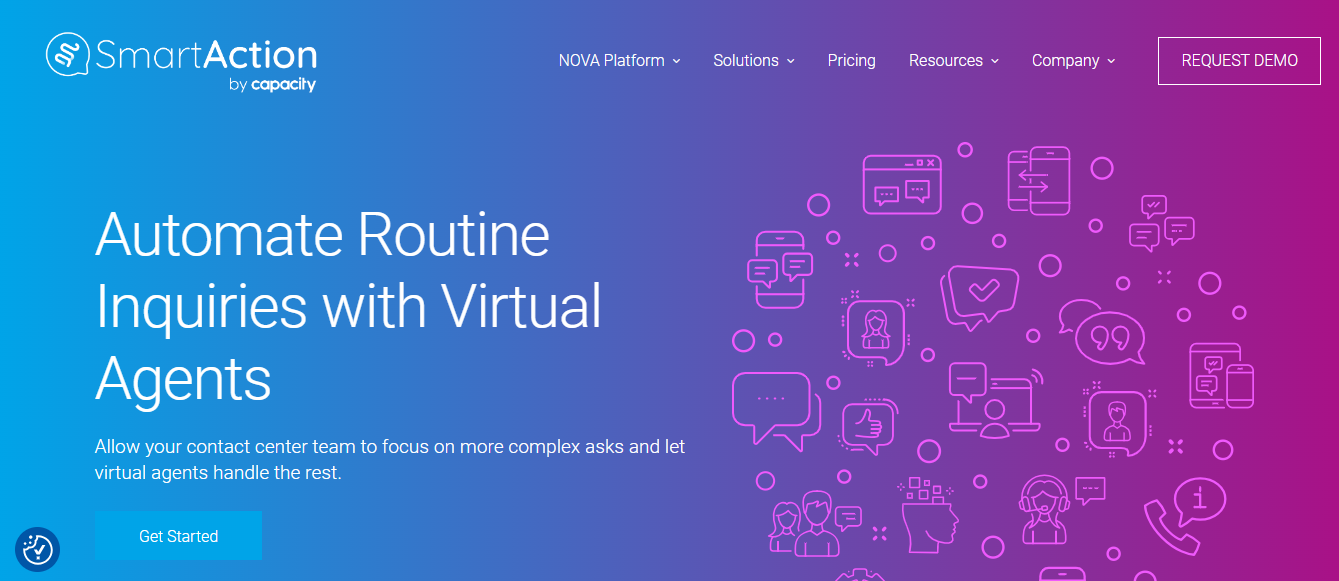
SmartAction provides virtual agents that handle complex customer interactions using natural language understanding. With features like 24/7 availability and integration with traditional IVR systems, SmartAction helps reduce costs while improving the quality of service.
Interactions LLC

Interactions LLC combines AI capabilities with human oversight to ensure high accuracy and natural conversations. Its virtual assistants manage complex inquiries, offering personalized interactions while seamlessly integrating with existing customer service platforms.
Conclusion
Implementing AI solutions in call centers is transforming how organizations handle customer interactions, reducing costs, improving efficiency, and enhancing the overall customer experience. The integration of conversational AI and AI Voice APIs like Speechify offers opportunities to automate repetitive tasks, optimize contact center operations, and ultimately drive customer satisfaction. As AI technology continues to evolve, businesses that embrace these innovations will lead the way in providing superior service experiences while maintaining the essential human touch in their customer interactions.
FAQ
What is the difference between chatbots, bots, and AI agents?
Chatbots handle conversational interactions, bots perform automated tasks, and AI agents combine conversational abilities with advanced decision-making and contextual understanding.
How is AI used in call centers?
AI is used in call centers to handle customer inquiries, provide self-service options, route calls intelligently, and assist agents with real-time insights and recommendations.
What role can artificial intelligence play in contact centers?
Artificial intelligence enhances contact centers by improving customer experience, streamlining workflows, automating repetitive tasks, and providing analytics for better decision-making.
What is an AI call center?
An AI call center leverages artificial intelligence to automate customer interactions, assist human agents, and optimize operations for efficiency and personalization.
How does contact center AI work?
Contact center AI integrates machine learning and natural language processing to understand customer needs, respond intelligently, and assist with tasks like routing, analysis, and agent support.
How can I create a custom AI agent?
To create a custom AI agent with lifelike, multilingual voice capabilities, use the Speechify AI Voice API for seamless integration and powerful customization options tailored to your needs.

